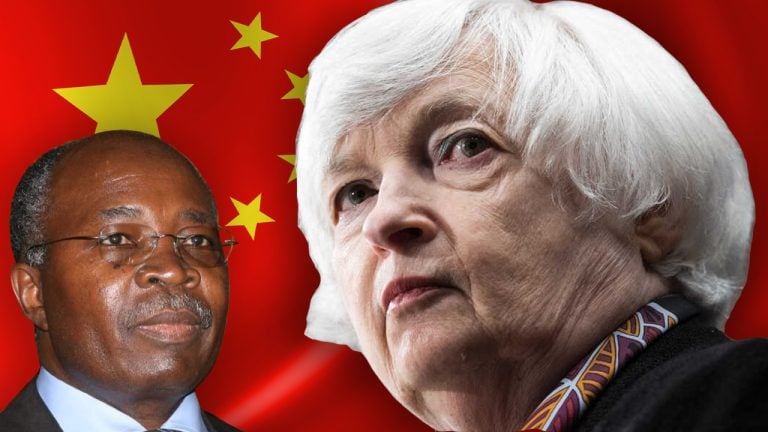
A Chinese state-owned newspaper has warned that corrupt officials could be funneling crypto into cold storage to avoid investigations. Legal Daily, a media outlet directly under the control of the Chinese Communist Party (CCP), notes in a new report that experts at the China Integrity and Legal Research Association’s 2023 annual meeting drew attention to […]
The post Chinese State Media Warns Corrupt Officials May Be Using Cold Storage Crypto To Avoid Investigation: Report appeared first on The Daily Hodl.

Six US Congressmen are alleging that a digital asset firm may have lied about working with the Chinese Communist Party (CCP). According to a new letter, the congressmen allege that Prometheum, Inc. “may have provided false testimony to Congress or violated US securities laws.” The congressmen, including Republican Senator Tommy Tuberville and Republican House of […]
The post US Lawmakers Accuse Founders of Digital Asset Firm of Working With Chinese Communist Party appeared first on The Daily Hodl.
 The Chinese embassy in Zambia denounced the United States over its debt limit and the “extraordinary measures” Treasury secretary Janet Yellen has implemented to stave off a U.S. debt default. Yellen said on Monday that it was very important that Zambia restructure its debt, but Zambia sees it differently. The embassy castigated Yellen’s comments in […]
The Chinese embassy in Zambia denounced the United States over its debt limit and the “extraordinary measures” Treasury secretary Janet Yellen has implemented to stave off a U.S. debt default. Yellen said on Monday that it was very important that Zambia restructure its debt, but Zambia sees it differently. The embassy castigated Yellen’s comments in […] With the Ethereum Merge event now successfully completed, new proof-of-work (PoW) forks have emerged to vie for miner acceptance. This, as the United States government, has warned that the post-quantum world is getting closer, and vulnerable cryptography will need to be protected. Amidst red hot inflation in the U.S., President Joe Biden notes that gas […]
With the Ethereum Merge event now successfully completed, new proof-of-work (PoW) forks have emerged to vie for miner acceptance. This, as the United States government, has warned that the post-quantum world is getting closer, and vulnerable cryptography will need to be protected. Amidst red hot inflation in the U.S., President Joe Biden notes that gas […]
China has used its Economic Daily media outlet to signal that further regulatory action may be taken toward stablecoins in the wake of the collapse of Terra’s algorithmic stablecoin.
The China state-owned media outlet, the Economic Daily, has signaled that the Chinese government may introduce even tighter regulations on cryptocurrencies and stablecoins due to the collapse of the Terra ecosystem.
In an article published May 31, the outlet detailed the collapse of TerraUSD (UST) and Luna (LUNA), explaining the workings of the algorithmic stablecoin. It used the so-called black swan event to praise the Chinese government’s decision to ban cryptocurrency.
“My country has been cracking down on virtual currency trading speculation and a large number of trading platforms,” reporter Li Hualin wrote before adding, “this has effectively blocked the transmission of this risk in China and avoided investment risks to the greatest extent possible.”
Hualin explained that “many other countries” are looking to regulate stablecoins following the Terra collapse and quoted Zhou Maohua, a researcher at the China Everbright Bank, to make a case for further restrictions within China:
“In the future, our country will also speed up the completion of regulatory shortcomings, and introduce targeted regulatory measures for the risk of stablecoins to further reduce the space for virtual currency speculation, illegal financial activities and related illegal and criminal activities, and better protect the safety of the people.”
After banning crypto exchanges back in 2017, the Chinese government has been toughening its stance on crypto again since mid-2021. Multiple agencies warned of the risk of investing in crypto, and a major crackdown on mining within the country took place.
Colin Wu, a China-focused cryptocurrency reporter, cleared up the misconception around the ban, telling Cointelegraph that the laws don’t allow institutions to provide crypto services “but they don’t prohibit ordinary people from using cryptocurrencies — there is no clear law to prohibit it,” adding:
“Institutions and enterprises are completely banned from trading or owning cryptocurrency in China, but individuals are free to own, buy and sell, and some local courts even consider them to be legally protected as virtual property.”
Earlier in May, a Shanghai court found that Bitcoin (BTC) is subject to property rights, laws and regulations as its value, scarcity and disposability meet the definition of virtual property according to the court.
As for how traders obtain crypto in the first place, Cointelegraph previously highlighted the rising use of VPNs among Chinese traders. Following the last round of restrictions, traders began increasingly using offshore exchanges or peer-to-peer (P2P) platforms for all of their activities.
Related: City of Shenzhen airdrops 30M in free digital yuan to stimulate consumer spending
Wu says there is a “great possibility” that the Chinese government would impose even tighter restrictions or even complete bans on stablecoins to prohibit ownership, transfer, purchase and sale of the assets, “especially for Tether,” he added.
But, China may not stop at its own borders, as the Chinese Communist Party-owned outlet said that regulators in other countries should “strive to formulate global general rules” to tighten scrutiny on cross-border payments.
The Beijing regime outlet concluded that the move will “prevent virtual currency from becoming a tool for money laundering, fraud, and illegal fundraising.”

Marty Bent, the co-founder of Bitcoin mining firm Great American Mining, is glad to be hodling Bitcoin as uncertainty hangs over the legacy financial system
As the prospect of Chinese property giant Evergrande defaulting on $305 billion worth of debt looms, pundits are weighing in on how the firm’s bankruptcy could impact the legacy and crypto markets.
Speculation as to whether the real estate investment giant will default has coincided with a downturn across the crypto and stock markets, leaving many analysts divided on whether traders should be buying the dip or looking to take profits in preparation of further bearish momentum.
At the time of writing, Bitcoin (BTC) is down by around 13% since the downturn started on Sept. 18, while the S&P 500 is down by 1.7% and the Hang Seng has dipped 2.8% within the same time frame.
Some are asserting that Evergande’s possible default could represent another Lehman Brothers moment — citing the major investment bank’s 2008 declaration of bankruptcy on $600 billion worth of debt that kicked off the Global Financial Cris.
However, speaking at the Greenwich Economic Forum on Sept. 22, Bridgewater Associates co-chairman and co-CIO Ray Dalio downplayed the significance of an Evergrande default and suggested that the debt is “manageable.”
Dalio admits that while investors will be stung, he thinks that Evergrande’s debt won’t cause structural damage, as the Chinese government may swoop in to restructure the firm and strike deals with the company. He said:
"[The] Lehman moment produced pervasive structural damage through the system that wasn't rectified until the Treasury came across in terms of its borrowing and then the Fed came across with quantitative easing, but this is not that kind of a shake-up."
Ming Tan, a director at the credit rating agency Standard & Poor’s (S&P) predicts the Chinese state will intervene to restructure Evergrande.
Speaking to Financial Times on Sept. 20, Tan speculated that said restructuring is likely to see the “profitable parts of [Evergrande’s] business bought up by rivals,” with its debt obligations likely to be underwritten by either a consortium of commercial Chinese banks or the local central bank directly.
Influencer Lark Davis also isn't too concerned:
Most analysts seem to believe that Ever Grande will not lead to a global contagion event like Lehman did.... can we get back to the bull run now please? #bitcoin
— Lark Davis (@TheCryptoLark) September 22, 2021
Not everyone is so optimistic. The host of CNBC’s Mad Money show, Jim Cramer asserted Evergrande’s debt issues will likely impact the crypto market because nearly half of the reserves backing the leading stablecoin Tether (USDT) are held in commercial paper
Cramer urged for investor caution while Evergrande awaits a verdict on a potential government bailout, stating:
“I know the crypto-lovers never want to hear me say sell, but if you’ve got a big gain as I did, well, I’m begging you: Don’t let it become a loss. Sell some, stay long the rest, then let’s wait and see if China changes its attitude toward an Evergrande bailout.”
While Tether has denied holding any commercial paper issued by Evergrande, analysts have warned that the fallout from an Evergrande restructuring could have significant impacts on the broader commercial paper markets.
“Tons of Chinese businesses stand to get crushed by this fiasco, and they have Evergrande exposure, and that could spell real trouble,” said Cramer.
Marty Bent, a podcaster and the co-founder of Great American Mining, also sounded alarm bells in his Sept. 20 newsletter.
Bent suggested that an Evergrande default will unveil how “exposed the Western world is to China's economy” via investments in the large real estate players, their debt instruments, and the debt issued by the Chinese Community Party (CCP).
“Evergrande is going under and it is dragging other large real estate developers in China down with it. The world is witnessing another Lehman moment,” he said.
Bent questioned the assertion that Evergrande is likely to be bailed out by the government, noting the party’s recent push to rein in Chinese capitalism and tighten regulations on the real estate market.
“The CCP has come out and stated that they do not plan on backstopping the real estate developers who are currently plummeting toward bankruptcy. It will be interesting to see if they keep this posturing as things get worse,” he said.
The podcaster also noted that while he unsure how the fallout from Evergrande will impact Bitcoin in the short to medium term, he is “thankful” he can hold Bitcoin as a hedge against the fiat-backed global financial system.
Ok who is buying the dip?✋
— Dan Held (@danheld) September 21, 2021
Related: ‘Extreme fear’ as Bitcoin falls below $40K ... and then bounces
The share price of Evergrande has been steadily declining during 2021 as its credit woes have mounted. After opening the year at roughly $14, the price sits now at $2.20 — a loss of more than 84%.